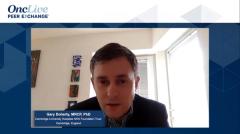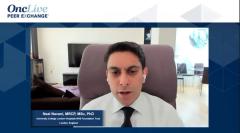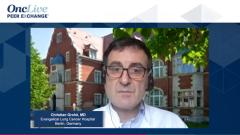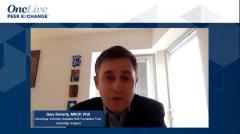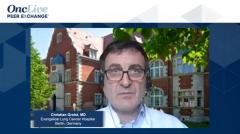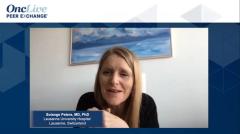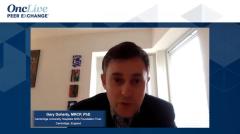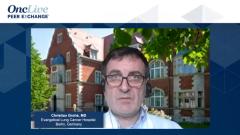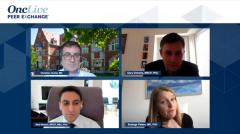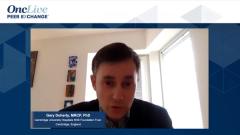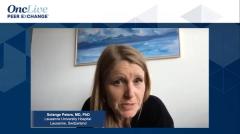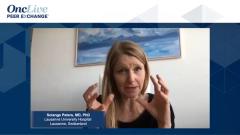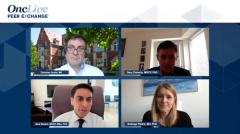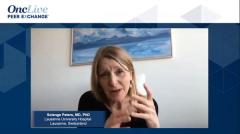
Treatment of Unresectable EGFR-Mutated NSCLC
Key opinion leaders in lung cancer have a lively discussion on the challenges associated with making treatment decisions for patients with unresected stage III EGFR-mutated NSCLC.
Episodes in this series

Neal Navani, MRCP, MSc, PhD: Let’s switch slightly. Christian, if I you could talk about unresectable stage III disease in patients with an EGFR mutation. If you’re faced with a patient who has had the concurrent chemoradiotherapy, does the EGFR mutation affect your subsequent treatment? Do they still get immunotherapy, based on the PACIFIC trial, or do you do something else?
Christian Grohé, MD: We’re still in the process of analyzing the molecular data of these patients. There’s a short but very interesting tutorial about that in the JTO [Journal of Thoracic Oncology], about what we’re going to do if they define an EGFR mutation in this cohort. Obviously, the magnitude of benefit for these patients with EGFR mutations who underwent a PACIFIC trial–based protocol and received it from follow-up until now isn’t as positive as it is if you don’t have an EGFR mutation. This is a very important issue because more studies will come out soon that are trying to understand and elucidate the role of I/O [immuno-oncology] in that setting. By now, if somebody has an EGFR mutation at our institution [Evangelical Lung Cancer Hospital], I’d try to understand if we do really go into the development of a treatment plan, or discuss that in detail with the insurance company by saying, “This is an advanced disease” and that we would like to consider that as a systemic treatment option. This would be upgrading the patients for the insurance company in terms of understanding what’s going on.
We definitely need more data in that setting, and there are more data coming from different kinds of clinical trials at stage III. I think this is a very important issue, and we will finally come to the conclusion that we have 2 completely different ballparks in the near future: the driver mutations for systemic disease in all stages and the patients for whom I/O treatment is an option. This is going to be a completely different ballpark. Understanding resistance mechanisms, following up, knowing the sequence of therapeutic options, and having multimodality will all be necessary. We have to understand: There are going to be 2 completely different, major ballparks. This is a great task and a great challenge, but it’s very interesting. I’m very curious as to how we’re going to solve that problem. Perhaps by implementing large data registries and recommendation sets to tackle that problem.
Neal Navani, MRCP, MSc, PhD: Thanks, Christian. Gary, can I get your view on this? If you have a patient with unresectable stage III disease and an EGFR mutation, how do you proceed after concurrent chemoradiotherapy?
Gary Doherty, MRCP, PhD: I was hoping you’d ask Solange first. This is super tough. It’s not wholly unreasonable to offer treatment based on the PACIFIC data. Chemotherapy is licensed in this setting, but from what we know, these tumors are responsive, particularly to immunotherapy. It’s a different setting after concurrent chemoradiation. My feeling is they’re unlikely to benefit much. I’d enroll these patients in a clinical trial when available. The LAURA trial will help us answer this question about the consolidation of osimertinib. I’ve had this dilemma a few times. I’ve asked the patient. I presented the uncertainties, and the patient has elected not to have adjuvant durvalumab, but the jury is out. Now, Solange will give me the correct information.
Neal Navani, MRCP, MSc, PhD: Solange, you’re the clinical trialist, the purist. What do the PACIFIC trial data tell us?
Solange Peters, MD, PhD: The PACIFIC data got all my attention because I had to fight—I’m in Europe—the idea that the PD-L1 first helps a group analysis. The EGFR subgroup is the same. It’s a post hoc subgroup that was not stratified, was not addressed, and was probably incompletely identified, or wrongly done, in terms of sampling and identifying EGFR mutations. About PD-L1—what’s your hypothesis, that maybe some would benefit less? That doesn’t mean they don’t benefit at all. You need to make sure they don’t benefit at all. You need to prospectively assess them—observe the experimental arm vs the placebo; it’s the same thing for our immunotherapy and LKB1, STK11, right? They benefit less, but is it enough to say that they don’t benefit at all? No, we need to address it prospectively. There are all these questions about subgroups, and hypothesis-generating, right? There should not be more. Regarding the study of EGFR mutations in the PACIFIC trial, it was conducted in small subgroups—probably poorly identified or incompletely identified, but still deriving benefit. I’d still offer them the same strategy.
I love the idea of clinical trials. The best way to identify new ways to move is always clinical trials, so I’d use clinical trials if I had a choice. Otherwise, I would still propose the durvalumab in the treatment of this patient. Durvalumab may have less of a benefit. Remember. the margin of benefit in the PACIFIC data is huge. Maybe you’ll save someone’s life. I will still use it. I had to question my statement in Asia because in Asia you have a high prevalence of EGFR mutations, which is unlike in my country. Very often, in Asian countries, the different I/O treatments are paid out of pocket. Suddenly, you also meet a social recommendation, which probably suffers more there because of the lack of prospective data, but that’s not the topic. We’re in Europe and in the United States. We should still probably offer it to the patient. If you don’t have a better clinical trial, the data will come, right? These trials are ongoing.
Neal Navani, MRCP, MSc, PhD: Thank you, Solange. That’s a clear and excellent answer.
Transcript Edited for Clarity


